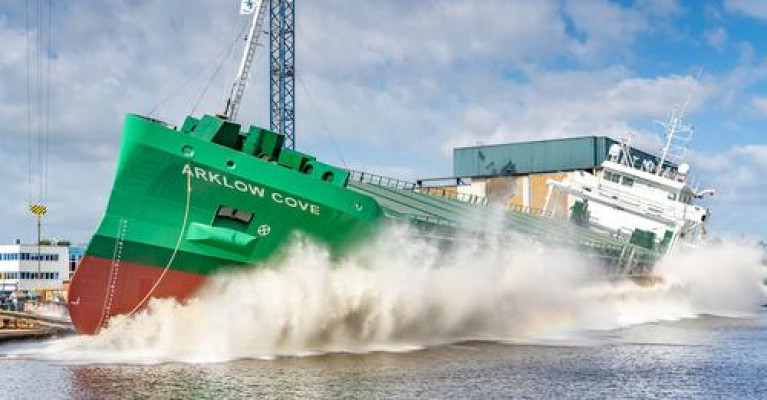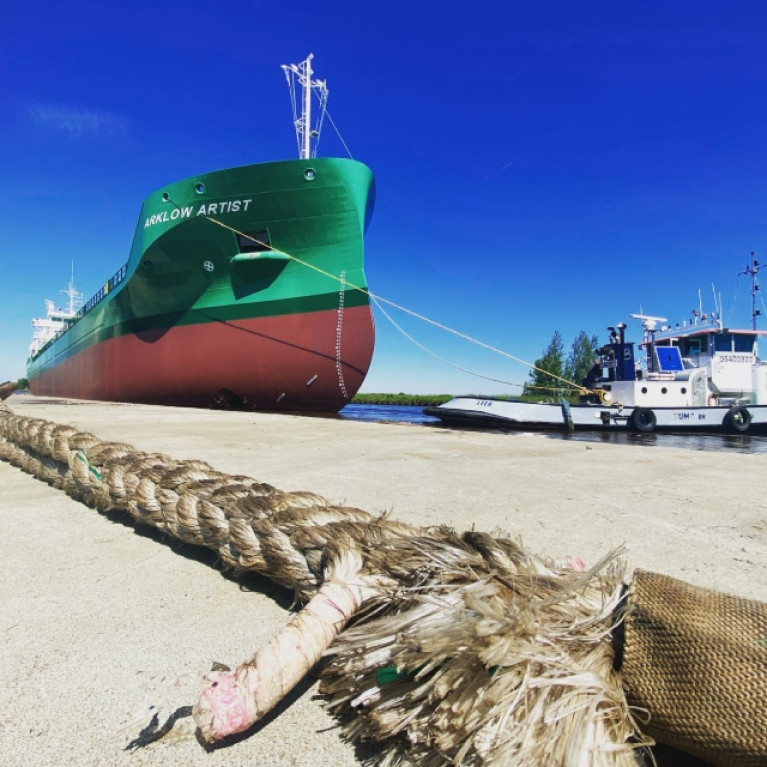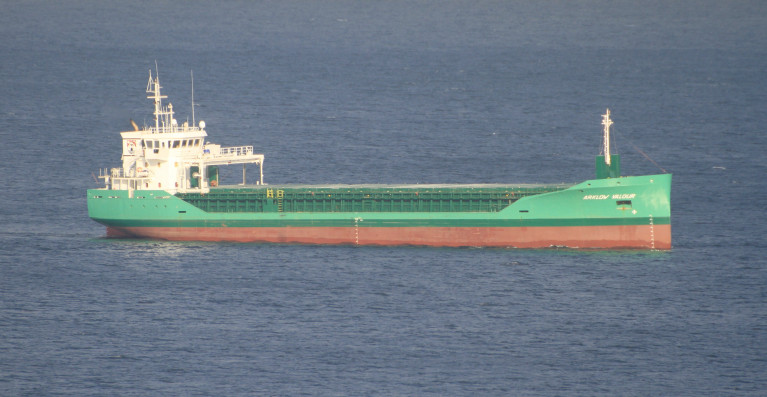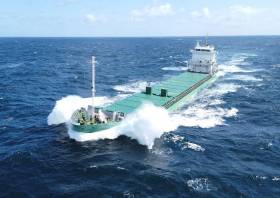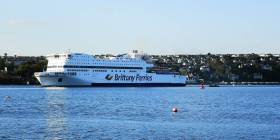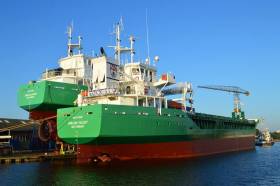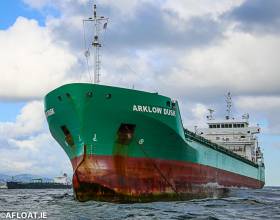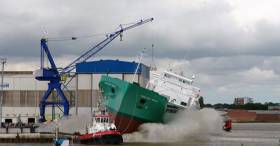Displaying items by tag: Arklow Shipping
Port of Ipswich is UK Number One for Export of Agricultural Products
The UK's largest ports operator, Associated British Ports (ABP) which includes the Port of Ipswich, has retained its place as the number one export port for agricultural products for the 18th year in a row.
This sees the North Sea port beating London, Bristol and Great Yarmouth to claim the title and was confirmed by the Department for Transport’s recently published UK port freight statistics.
Department figures show that the Port of Ipswich exported 631,000 tonnes of agricultural commodities in 2022, 23% of UK major ports’ market share of agricultural products export tonnage last year.
The Port of Ipswich’s performance reflects its key location at the heart of the Suffolk and North Essex agricultural community, and the role of the region as the ‘breadbasket’ of the UK.
In addition to holding the accolade of being the biggest exporter of agricultural products, ABP’s Port of Ipswich was also the UK’s fifth most important port for total agricultural traffic in 2022, handling 773,000 tonnes of agricultural commodities.
As well as agricultural products the port handles a range of other products such as fertiliser, cement and aggregates.
Paul Ager, Divisional Port Manager for ABP, said:“It’s fantastic that we have seen continuously high agricultural export volumes, which have helped our port retain its top position as the UK’s number one export port for agricultural products.
“Our business plays an important role in supporting supply chains in East Anglia, and keeping agricultural products moving in support of local businesses and farmers in the region.
“We are looking forward to maintaining this position for 2023 as we’ve had a record-breaking 2023 so far, having announced at the end of May 2023 that the port handled over 1 million tonnes of exports and imports since the start of the year – the first time the port has supported over 1 million tonnes of various products.
“We are grateful to all our customers for continuing to choose ABP’s Port of Ipswich to handle their imports and exports.”
Julian Scott, General Manager, Clarksons Port Services – Sentinel Terminal, said:“Following on from a successful 2022, we’ve also seen a very good start to 2023. Harvesting this season is having its challenges for farmers, compared to last season, with weather delays, however, grain quality in Suffolk and the surrounding counties is remaining good. We are now well into the harvest season with exports continuing, and with a few more dry days most of the wheat and barley harvesting in this region will be completed by this weekend. At the terminal we are looking forward to a busy programme of exports for the remainder of the year.”
“Clarksons enjoys a close working relationship with ABP, and their provision of excellent facilities means we can continue to provide a first-class service to all our customers.”
ABP has recently marked 25 years of its ownership of the port, as well as the tenure of Clarkson’s Port Services (CPS) at the port’s Sentinel Terminal. In those 25 years, the port has celebrated a number of milestones, including becoming the UK’s number one grain export port, which it has remained as every year since 2005.
ABP has also invested £49.6m in the port since 2012 and handled 68.4 million tonnes of cargo between 1997 and 2022.
C Class Coaster 'Cove' Is Latest Launched Arklow Newbuild
At the weekend Arklow Cove was launched from a Dutch shipyard that now brings to the ninth newbuild of 10 'C' class coasters on order by the Co. Wickow shipowner, writes Jehan Ashmore.
The sideways launch of Arklow Cove at the Westerbroek shipyard of Ferus Smit, took place on Saturday and once again the 5,054dwat class involved a new ship name for Arklow Shipping Ltd.
Likewise of Irish-flagged C class fleetmates, the newbuild will be towed on the canal waterway to Eemshaven to undergo sea trials in the North Sea.
Arklow Cove has a volume of 220.000cft and carrying capacity over 5000 deadweight tons. Typical cargoes of the handy sized coaster will involve loading grain into a single-hold just shy of 60m within a hull length overall (LOA) of 87.40m.
The newbuild has a 1A iceclass notation and is propelled by a 1,740 kW MaK engine with a single ducted propeller.
The 2,999grt coaster marks the continues upgrading of ASL's Irish and Dutch flagged fleet of 55 vessels comprising mostly of short-sea traders and several deep-sea bulkers that also trade beyond northern Europe.
Among the fleet is the dwindling R class coasters of which just four remain plying their trade with the oldest member of this former 16-strong class, Arklow Rainbow dating to 2006.
A new cargoship Arklow Artist, the sixth and final of the 'A' class series built at a shipyard in The Netherlands was recently delivered to Co. Wicklow shipowners, writes Jehan Ashmore.
As the video shows the bulk-orientated general cargsoship's transit along the River Ems canal from the inland yard at Westerbroek to Delfzijl.
It was in the nearby north-east Dutch port of Emshaven on the North Sea where shipyard Ferus Smit handed over the Irish flagged newbuild to Arklow Shipping Ltd.
This latest ship series using the nomenclature prefix of 'A' for ASL all began with leadship Arklow Abbey launched in 2019. Whereas a trio of the series named Arklow Accord, Ace and Archer were delivered last year. Leaving the penultimate newbuild, Arklow Arrow launched in December but did not enter service until earlier this year.
Aided by tugs stern and aft, the 8,543 (dwat) Arklow Artist made the transit from the shipyard to Delfzijl, the base for sea trials that took place in the southern North Sea.
The video also depicts a typical Dutch setting of a commercial canal barge passing Arklow Artist against the backdrop of an agricultural scene of a farmstead in the lowlands nation.
At the end of the footage, as Arklow Artist approaches the canal which splits into two, the newbuild veers into the canal on the right so to enter Delfzijl with its background of wind turbines dominating the horizon.
A Drogheda Harbour pilot boat captain has told the High Court “we all underestimated” the underwater clearance a cement-laden cargoship needed before it ran aground at the Co. Louth port in 2018.
Captain Andrew Breach was giving evidence in a €1.4 million action by Arklow Shipping Group which claims Drogheda Port Company authorities were negligent in the information provided about the harbour depth on the day of the incident on December 13th, 2018. Drogheda Port denies the claim.
Arklow Shipping claims it cannot operate in any port without reliable information about depth, readings of which it says should be taken on a daily basis. Drogheda harbour can require regular dredging, the court heard.
Following the grounding, the 4,000 tonne-plus cargo of cement was removed from the Arklow Valour (launched in 2016) the next day. The cargoship was later refloated and sent for repairs in Swansea, Wales.
The Irish Times has more on the story.
Five Injured Crew Airlifted From Irish Cargo Ship In Bay Of Biscay
Five crew were evacuated from an Irish cargo vessel yesterday (Tuesday 10 December) after encountering rough seas in the Bay of Biscay, as Maritime Bulletin reports.
The Arklow Day has previously left Aviles Port in northwest Spain on Monday evening (9 December) after offloading its cargo but sailed into challenging conditions, with waves reportedly nine metres high.
One of these waves struck five of the vessel’s 10 crew, believed to have been on deck in the open at the time, who were left with ‘serious’ injuries.
The wounded seamen were airlifted to hospital by a Spanish rescue helicopter while the remaining five crew took the ship to the nearest port at El Musel on the Cantabrian coast.
The Arklow Day was acquired by Arklow Shipping from the Flinter Group two years ago, as previously reported on Afloat.ie. The 132m vessel, previously known as Flinter Aland, has a 13,008m3 hold capacity and a speed of 12 knots.
UK MP's Say Brexit Ferry Deal 'Rushed and Risky'
The UK government's Brexit ferry programme was "rushed and risky", according to a cross-party group of MPs, who confirmed the botched project had cost £85m.
As BBC News reports a procurement process to provide extra ferry services was held in anticipation of the UK leaving the EU on 29 March.
But MPs said taxpayers had "little to show" for the cost after the UK failed to leave the EU on that date and had to cancel deals reached with three firms.
The government defended the contracts, calling them an "insurance policy".
- UK seeks new no-deal Brexit freight plan
- UK government cancels Brexit ferry deals
- Seaborne Freight no-deal ferry contract scrapped (see related Irish shipping company story).
The contracts had to be cancelled after the date for Britain to leave the EU was pushed back from 29 March to 31 October.
For much more click here from the Public Accounts Committee report covering the ferry contracts and Out of Court settlement concerning EuroTunnel.
The Port of Galway is where Afloat.ie takes an impromtu look in at the city's dock where the focus on shipping movements concentrates on cargoships involved up to the end of this month, writes Jehan Ashmore.
In port this afternoon is Arklow Shipping's Dutch flagged short-sea trader, Arklow Valley which arrived yesterday from Belfast Harbour to engage in scrap steel. The 5,158dwat vessel was launched in 2016 as the fourth of 10 Royal Bodewes Eco-Traders commissioned by ASL.
It is somewhat unusual to see an ASL in the Port though what is a common sight is the Bláth na Mara, a domestic cargoship serving all three of the Aran Islands in Galway Bay. The operator Lasta Mara Teoranta is based at The Docks but at the pier beyond the enclosed single basin of the Dun Aengus Dock that forms the main port.
Typical cargoes carried on board Bláth na Mara range from food stuffs chilled and frozen, household goods, furniture, coal, cars, transit vans, tractors, horses in addition to various types of lifestock.
Recently, Islands Ferries announced plans to restore a direct passeger service from next year. The last such service which included freight was operated by O'Brien Ferries using the custom built Oileáin Árann.
At sea today is Bithav (6,834dwat) which is off the south Cork coast having departed with bitumen from Port Jerome, (Rouen) France. Likewise of Arklow Valley, this Dutch flag vessel will too remain in port until tomorrow when both vessels set sail in the morning.
On Sunday, Corrib Fisher is to make another arrival having loaded oil products from Cork Harbour at the Whitegate Refinery. The 6,090dwt tanker of UK firm, Jas Fisher Everard has in recent months taken over the routine duties of a fleetmate the aptly named Galway Fisher.
The 10 year-old replacement vessel is also on standby as an emergency oil spill response vessel for the European Maritime Safety Agency (EMSA).
#dublinbay- It was a busy scene in Dublin Bay during the May Bank Holiday as up to seven ships were at anchorage among them an Irish flagged cargo which stood out with its distinctive green painted hull, writes Jehan Ashmore.
The ship Arklow Dusk is the fourth and final of a quartet of 11,000dwt sisters acquired last year by Arklow Shipping following the bankruptcy of the Dutch based Flinter Group in 2016. The remaining sisters include Arklow Dawn, Dale and Day.
Acquisition of the former Flinter America and fleetmates as secondhand tonnage is unusual for ASL as the Co. Wicklow based company notably in recent years have taken delivery of newbuilds of various designs from Dutch and German shipyards.
Arklow Dusk had previously docked in Dublin Port after a voyage from Bilbao, Spain. On board was a cargo of cement products that were discharged alongside Ocean Pier. This was the first time the 132m double-hold cargoship made a call to the capital.
On completion of unloading, Arklow Dusk proceeded 'light' to Dublin Bay to anchor in the early hours of Thursday night. On the Bank Holiday Monday, the arrival of cruiseship Norwegian Pearl stood out and as the inaugural caller of the season to Dun Laoghaire Harbour.
The presence of these seven ships on Monday was short lived as by mid-morning Arklow Dusk having awaited orders departed. The 'D' class ship was bound again for Spain but this time to Carino located in north-west of the Iberian nation.
As Arklow Dusk set a southbound course along in the opposite direction came Schelde Highway from Zeebrugge, Belgium. The vehicle-carrier headed into the bay to occupy the same area where the Arklow-registered cargoship had taken up anchorage for more than four days.
#shipping - Following last month's media headlines on Arklow Shipping and its relationship with Seaborne Freight which the UK Government had earmarked among firms to alleviate freight capacity in the event of a no-deal Brexit, the Irish company today added another newbuild, writes Jehan Ashmore.
The newcomer, Arklow Wind (see YouTube) was launched this morning after a christening ceremony was held in Leer, Germany. The shipbuilder, Ferus Smit Leer GmBH is where Arklow Wave the leadship of a quartet (or 'W' class), as Afloat previously reported was launched last year and entered service in October.
Arklow Wind at 16,500dwt is an enlarged version of the 8,500dwt ships that Ferus-Smit delivered to ASL in the past. The 149m newbuild bulker has two box shaped holds with a cargo capacity of 700,000cft hold volume.
Propulsion is achieved through a 3840kW main engine in order to achieve low fuel consumption. As for the associated propeller, this involves a duct for enhanced thrust at lower speeds and reduction of maximum installed propulsion power.
Arklow Wave which has been given an Iceclass 1A certification, is set to be delivered in April to the expanding Co. Wicklow based dry-cargo operator whose fleet exceeds more than 50 vessels. The name revives a predeccessor which was disposed as the final of the older W class all built outside Europe. This was a first for ASL when the order was contracted to a South Korean yard.
The majority of the fleet is Irish flagged while the rest of the ships are part of ASL's Dutch division, Arklow Shipping Nederland B.V. based in Rotterdam. Europe's largest port is also used as a port of registry for these vessels.
On a related note to the Seaborne Freight saga, the Dutch flagged Arklow Bank likewise built by Ferus Smit (Westerbroek yard in The Netherlands) featured on Channel 4's News coverage on Seaborne Freight. Controversary arose following the UK's Transport Secretary's cancellation of a contract to Seaborne to operate the Ramsgate-Ostend, Belgium route.
In addition Arklow Bank the leadship of the 'B' class series dating to 2014, this week docked in Dublin Port. By coincidence the vessel berthed at the same South Bank Quay to where Afloat's follow-up (photo) coverage was taken in relation to the Seaborne story broadcast on the UK TV news programme.
UK Prime Minister Challenged on Seaborne No-Deal Contract
#ferries - The UK Prime Minister, reports Channel 4 News, has once again backed the Transport Secretary Chris Grayling as he faced further criticism in parliament over the awarding of a contract to provide ferries in the event of a no-deal Brexit to a company with no ships.
Theresa May insisted that due diligence was carried out before start-up company Seaborne Freight was given a – now rescinded – contract.
But (yesterday) afternoon MPs grilled a senior Department of Transport (DfT) civil servant about how rigorous the checks into Seaborne’s main investor (Arklow Shipping) really were.
For much more featuring footage of Prime Minister's Questions in the House of Commons and the Parliament Select Committee hearing of the Dft official click here.
In addition to a report by the Irish Times earlier this week which also delved into Arklow Shipping's 'no contract' with the no-deal Brexit ferry firm plan of a Ramsgate-Ostend (Belgium) service.



























